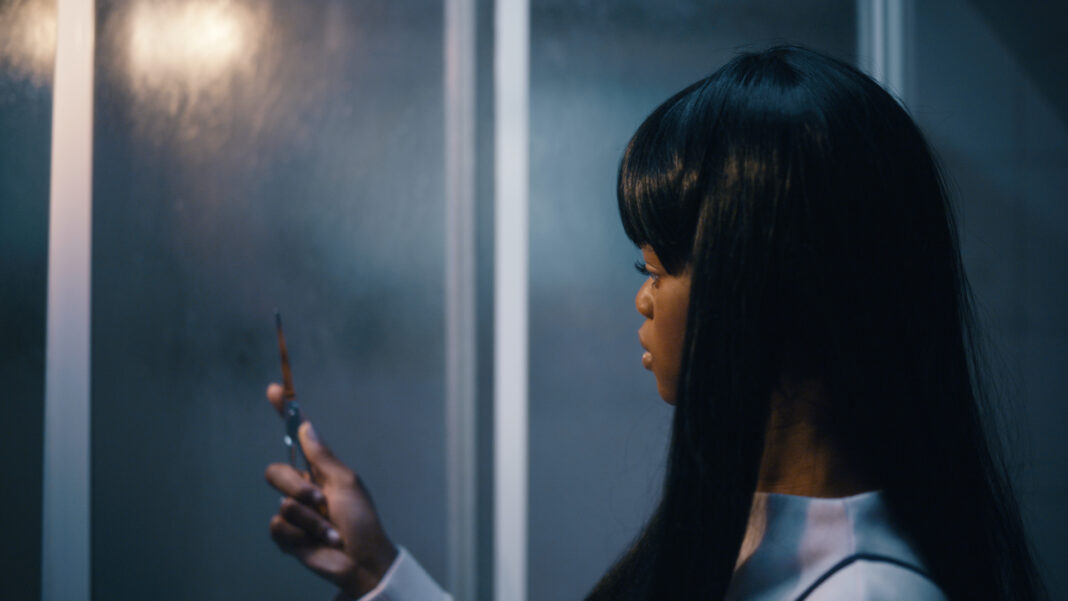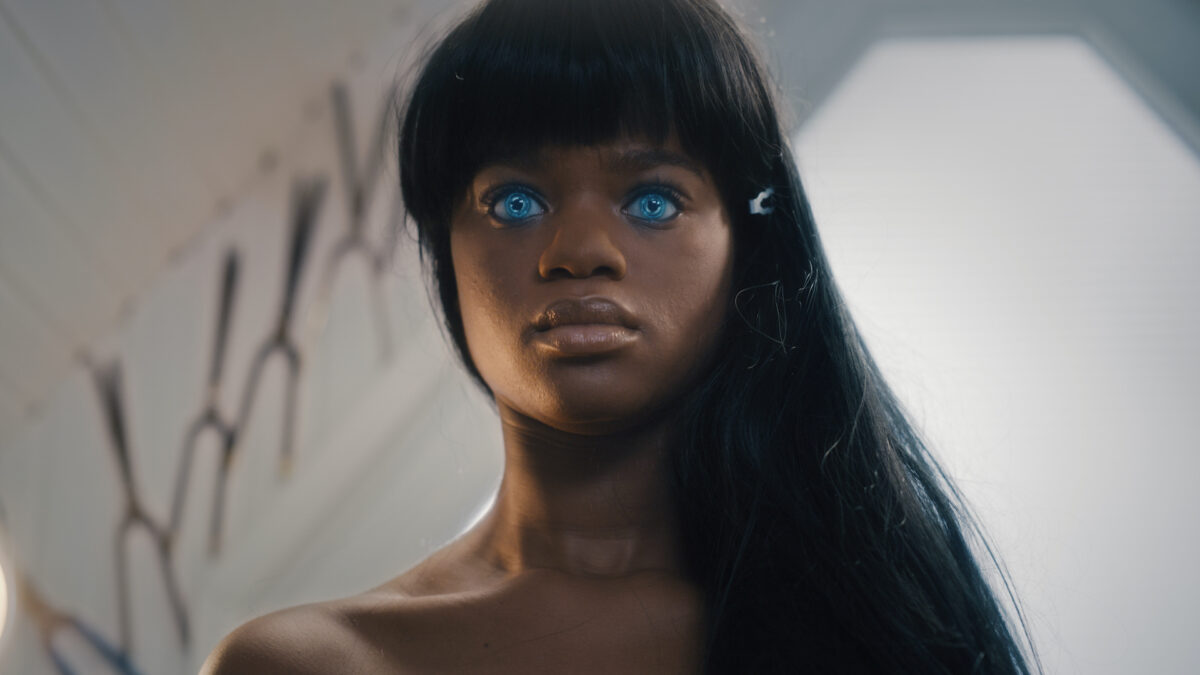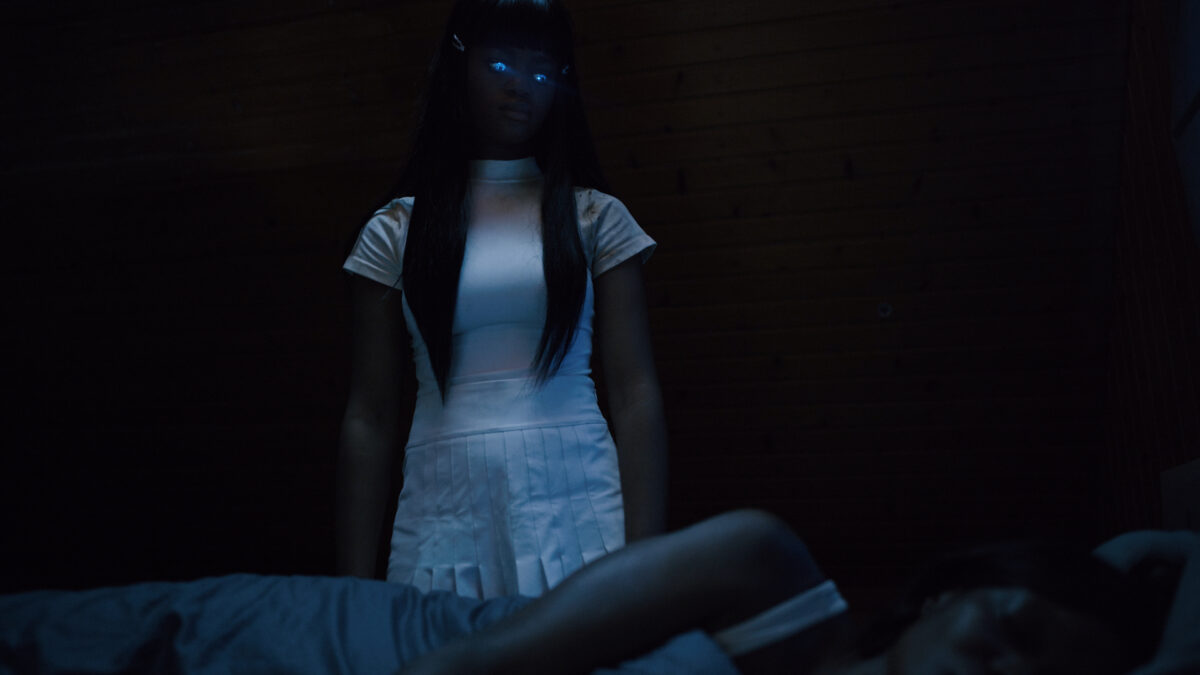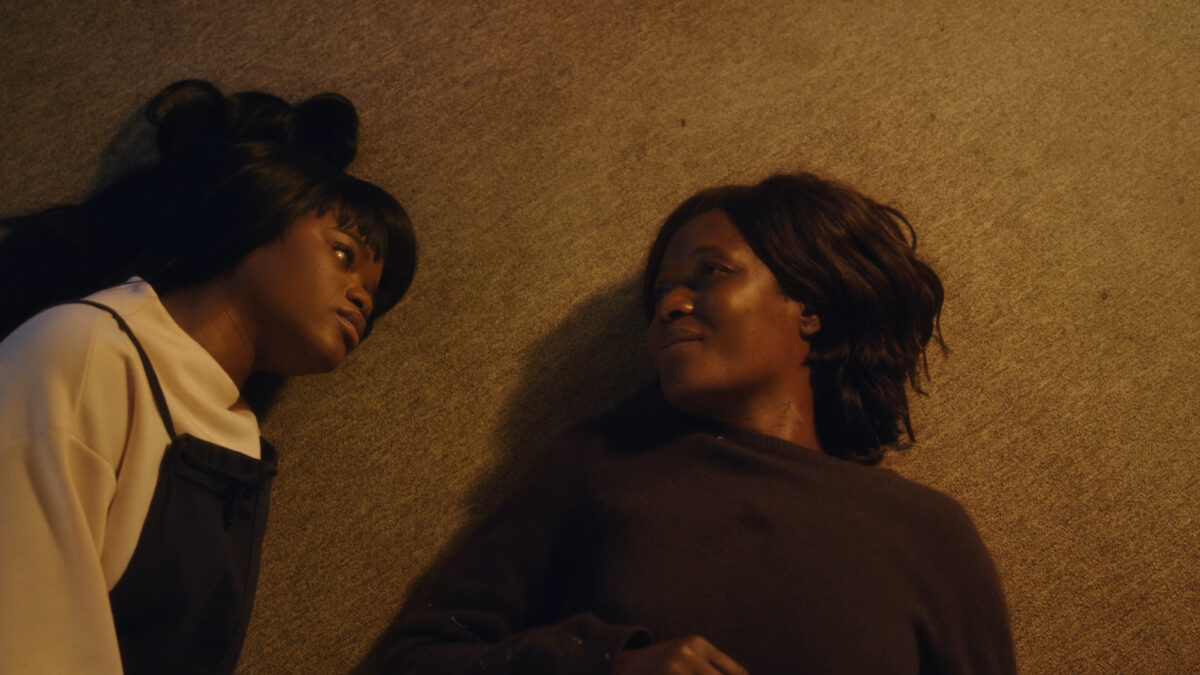Jerry Hoffman’s I AM focuses on the issues and relationships between a woman and an AI female discovering her heart at a remote location.
Film And TV Now spoke with the director, producer Stella Flicker, screenwriter Florens Huhn and Director of Photography Lena Katharina Krause.
The short is another person-vs-machine story, reminiscent of films like WESTWORLD and EX MACHINA. What fascinates you about this aspect of science and what was the start of point for the short?
When we started to develop the story for I AM our collective of four (screenwriter, producer, director, DoP) already knew about our mutual fascination for Artificial Intelligence. The four of us had previously produced a short film addressing gendered toys for kids and their impact on early on established gender roles.
There is a direct connection to the fact that most technical sciences are still dominated by (white) men. The developed voice assistants Siri, Alexa, Corana and co. are not only submissive and passive, they also all carry a female voice. The first humanoid robots on this planet were white female androids built by white male scientists.
The amount of outdated female gender roles created by white men in AI is obvious and from our point of view very problematic. Therefore inclusivity was one of the main forces to tell this story. A sci-fi story with two black female leads has not been produced in Germany before.
Telling this story was hugely important to us for many reasons. Among others, to give black actresses and narratives a spotlight and to address the lack of a diverse and female cast and crew in European films.
Given the current advancements in AI and computer tech, do you think we will see fully operational prototypes in the next century like a cyborg or a robot that isn’t something fictionalised?
These days we read headlines about humanoid robots being appointed to care work or counter work in Russia, China or Japan on a regular basis. Of course most of them are fascinating PR stunts and not yet to be taken seriously.
It might take some time before cyborgs or humanoid robots will be available to the public, but self-driving cars, voice assistants and so much more are already given. Before more robots become part of our society there are grand philosophical and ethical discords to be cleared up first.
Everything points to a more technological future in which complex androids are possible. We believe the question shouldn’t be if this century will encounter these robots, rather than how we interact with them and guarantee safe and dignified relations on both sides.
Tell us about your cast.
With I AM we are trying to set new standards for German casting, which is still very white and male dominated, as well as diversify the European film industry and tell universal vibrant stories.
When we first started casting we were confronted with the doubts of finding two great black actresses for this movie in Germany. We got over 150 e-casting submissions from breath-taking German-speaking actresses from Austria, Switzerland and Germany and we were shocked and saddened that we had not heard of so many of them as most of them had not appeared in big productions.
It was a revelation that made us feel both, angry about the industry for willingly ignoring so many talents, and motivated to change this by producing this movie. We hope that I AM supports a German future in which black female leads are a common normality.
Finding our main actresses Sheri Hagen and Melodie Wakivuamina was a true gift for this movie. Their sent-in casting videos were already promising, and the chemistry at the first live casting made it clear to us that these two have to play Noé and Ela. These two women are incredibly talented and a true pleasure to work with.
We are also very humble for getting the great actor Andreas Grötzinger to play the role of the ‘man’ – a character from whom you don’t even see his face and hardly any physics.
We truly couldn’t have asked for a better cast.
Tell us about your production team.
While telling the story about a female android, programmed to be submissive and dependent, who finds her own will and voice it was inevitable for us to have an open-minded crew who can treat the actors and the story delicately.
Also it was clear from the beginning, that we need a group of visual experts in the departments of VFX and SFX, but also Set Design, Make-Up and Costume, as we knew our sci-fi vision should be a visual and emotional experience set in a near German future. We emphasized on finding the right team members and came to halt of a great crew consisting of people of all genders, ages and diverse backgrounds.
It has always been inevitable to the four of us to create a comfortable and respectful atmosphere for everyone involved in the shooting and beyond. As we were shooting in August and September 2020 we had to adjust to the ongoing Covid-19 restrictions, which of course led to special care of relationships and personal circumstances which the team of I AM profoundly managed.
Where did you shoot and for how long?
After the first day of shooting in a film studio in Hamburg, Germany, we moved our production crew of roughly 25 people to a small town in Lower Saxony where we – after a long and intense research and location scouting – had found the perfect cabin in the woods for the story of I AM.
We stayed there for 16 days and nights sleeping in rustic hotels in the area. We shot many scenes at night and experienced the rapid change from summer to autumn in the daily temperatures.
As most of our team members were from Hamburg, we had to rely on the people living close to the cabin and collaborate in any way possible. We were lucky to have found so many generous people within the area who supported us with advice and guidance.
How did you raise finance for the short?
I AM was produced as our thesis movie in our Master’s programme at Hamburg Media School. We got most of our financing from the university, the Hamburg film funding FFHSH and the German TV broadcaster Bayerischer Rundfunk (BR).
In addition to that we were certainly lucky to have also found some generous sponsors to fill the missing gap to produce the movie on the scale that we intended to.
Two themes that emerge from this short are about diversity and also subconsciously the relationship between the sexes. Given the emerging concerns, what message are you hoping this film will communicate to those who see it?
The center of our movie is the relationship between two black women. Although there is one (presumably) male character at the end, the intention was to focus on these two women – one human being and one android – in a near future.
Although male dominance and oppression over the female body as some kind of ownership is part of the story, the focus lies on female empowerment and the questions about dignity.
It was important to us, to tell a story where the male body is not the center of attention nor needed for female satisfaction. The emerging consciousness about toxic masculinity and misogyny (which have been accepted over the past thousands of years of patriarchal structures in our society) is forming a small path to a future of intersectional justice for people of all genders, skin colors and social backgrounds and we are ready to walk that path.
Together with female leads and complex characters with their own will and choices, there are great stories yet to be told. Having two black female leads not talking about their skin color or race related identity struggles also seemed important to us.
We hope to inspire our audience to believe in a brighter future by acknowledging current injustices and acting on them.
You worked as a collective of four on a previous short called MALL. Tell us about this film, where can we see it and what is special about your core quartet of creatives that makes you gel as a total unit?
Our first short film MALL tells the story about a little boy who decides to secretly steal a doll mermaid and gets caught by the store detective.
The boy’s action puts his overly masculine father on the spot and urges him to take a stand. The movie is only a 5 minute short, was shot in black and white and copes without any verbal dialogue. It grasps the universal conflict around raising children to fit into a toxic society and its rooted stereotypes and gender roles. The four of us care for the script deeply as we can all identify with the young boy who acts on his desires even though some toys are labelled as wrong or “not meant for him”.
Over the past years of working together we have found a deep connection in our ideologies and philosophical worldviews and the consequential mutual interests in stories. We valid each other’s opinions genuinely and have lots of respect and love for one another – which makes working together a true blessing.
What issues and themes would you like to explore in future works?
There are so many stories to be told and of course the ones we are most excited for are diverse and emancipating female led stories of all kind. We are also very interested in playing with genres and creating film pieces that entertain just as much as they inspire. Life is changing rapidly on this planet, and we hope our stories manage to inspire a more inclusive and equal society.
This short certainly has the potential to develop into a feature or series idea. Are there any plans to expand on this short in that context?
Thank you! We are currently thinking about that. Our group interest in artificial intelligence, an inclusive German future and new science fiction stories is expanding.
FTVN: The film is premiering at Cinequest. What made you pick this festival for the short’s debut and what are you hoping to achieve from the festival circuit, given the film has already been selected for Cleveland International Film Festival?
We are extremely honored to premiere at this year’s Cinequest Filmfest.
The festival at the heart of Silicon Valley is known for the connection of vibrant storytelling and technological inventions and we thought a Science Fiction Story with a black female android is just the right film for that festival. We are so happy that I AM’s journey is continuing on other festivals and we are hoping for a long festival journey that is just about to start!
How are you coping generally and creatively through the current global situation?
As we produced our short during an ongoing global pandemic we are extremely humble that we were able to shoot without stopping production or having any serious health issues.
We are so happy to now be able to share our short online with the world, even though we do miss the experience of showing our movie in theatre to real-life audiences we can interact and talk with. We won’t stop dreaming about a cinema premiere where we can celebrate the journey of our film with our team, family and friends someday.
We also do know that we are in a very privileged position of still being able to finish our master’s degrees and finding great following jobs and projects. These tough times of social distancing have shown the importance of good storytelling and home entertainment and there are new opportunities ahead of us.
Finally, what are you most proud of about this short?
I AM is bold, exceptional and rare. We are so proud that the four of us managed to create a short film that has not been seen in Germany before. We are proud of the amazing actresses and their stunning performances.
We are proud of ourselves, of overcoming the never ending hurdles in the production of this movie in a time of uncertainty. But most of all we are thankful for each and every team member and supporter who went with us all the way to make this movie possible.
































